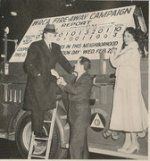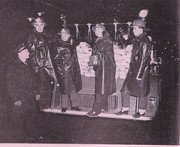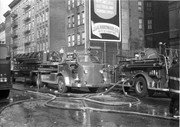You are using an out of date browser. It may not display this or other websites correctly.
You should upgrade or use an alternative browser.
You should upgrade or use an alternative browser.
My younger Buff years
- Thread starter nfd2004
- Start date
M
mmattyphoto
Guest
Just did not want to forget E50-2, knew some guys that past through there.
M
mmattyphoto
Guest
we missed the 56 Batt,they were the 2nd section of the 18th Batt. ??
johnd248 said:Another oldie: having to shovel ashes out of the coal furnace at Engine 248. Their quarters were heated by coal up until 1972 when they moved from Church Avenue to Snyder Avenue. The chauffeur was in charge of the furnace and had to "bank it" before going to bed. We had to haul metal cans full of ashes up out of the basement using ropes and put them on the sidewalk for pickup by Sanitation.
Thanks John for that Oldie but Goodie. And Thanks "Vbcapt" and "Matty" for including Eng 50-2 and the 56 Batt.(Batt 18-2). Remember those Second Section Helmet Front inserts. I'd sure like to have a few of those. Those, and the Combo Companies Inserts.
- Joined
- Mar 8, 2007
- Messages
- 5,392
I know it's hard to read it but look at my timeline carefully and you'll see BC56 on Oct. 18, 1969.mmattyphoto said:we missed the 56 Batt,they were the 2nd section of the 18th Batt. ??
- Joined
- Nov 27, 2008
- Messages
- 8,576
johnd248 said:Another oldie: having to shovel ashes out of the coal furnace at Engine 248. Their quarters were heated by coal up until 1972 when they moved from Church Avenue to Snyder Avenue. The chauffeur was in charge of the furnace and had to "bank it" before going to bed. We had to haul metal cans full of ashes up out of the basement using ropes and put them on the sidewalk for pickup by Sanitation.
We had a coal furnace when we were kids. Had to do all the things you talk about. All our friends had oil heat and thermoststs!!!!!
- Joined
- Nov 9, 2008
- Messages
- 7,654
kfd274 - You have the overview right but as I recall you always seemed to have a knack for getting out of most of the heavy work. I used to prep the kindling - the private sanitation truck servicing the A&P used to drop the produce crates in front of the house and we would take them in and split them up into small pieces with an axe. Remember they would put the coal chute in through the cellar window into the coal bin -we would get deliveries from Scranton & Lehigh Coal Co - sometimes Dietz Coal Co. We weren't allowed to play in the coal bin either for safety reasons and also we would get soot all over our clothes. I got punished pretty well 50's style when I didn't comply!
I remember banking the fire too. My first experience with banking was with coal - not with money!
I remember banking the fire too. My first experience with banking was with coal - not with money!
- Joined
- Jan 16, 2009
- Messages
- 2,896
johnd248..............I really dont miss the old days of the coal. First was the delievery via the front of quarters into the two seperate chutes, one for the small and one for the large coal bins. While the coal was being dumped down the chute, some fools like me had to be in the coal room to even out the coal as best as possible....When completed you were very very black with the snot dripping which was also black. A good 1 hour heavy shower usually cleaned you out. Then as you stated, starting the fire, banking the fire at around midnight, and hoping it didnt go out after coming back from a long job. Putting the ashes in the cans were the easy part, but now to pick up those old heavy heavy garbage cans filled with ashes..........It was 3/4 time for some..................At 319 we rigged up a lift, tied off the can in the basement and pulled it up with the front bumper of the rig.........Saved alot of stairs and showers, ha ha
Good meals and meal interruptions are part of the fire service. Meals are still interrupted today but are more salvageable with the microwave oven. It was almost guaranteed that one or two boxes would come in during any evening meal during the war years. It was not uncommon to leave the cook back if a good meal was being cooked. My dad instructed me in the different approaches that firefighters used to handle a potential lost meal when a box hit. Most guys were "gulpers", trying to inhale all remaining meat/potato/vegetable in two final bites. The "wrappers" covered their plates with paper towels/napkins/plate and shoved them into the refrigerator. They would later debate who belonged to what plate and try to heat their meals as best they could before the next box hit. The "bring it with you" guys always seemed prepared with two slices of bread next to their dishes. They could make a meat loaf and mashed potato sandwich in a few seconds and finish it on the back step. Then their were a few "drop your fork and run" guys who left everything on the table and ran for the rig. The evening meal was started often started at 8, continued at 10 PM and finished at 2 AM.
"Loved the story Mack". How true that was from what I saw. My first visit to Engine 82 was about 3 AM. My buddy and I were invited to join the Brothers for their evening meal of meatloaf, mashed potatoes and green beans. A couple of bites for the Engine guys just before they hit the road for a third alarm. I stayed with the Truck. I guess because I liked to eat. Well, that didn't last long as the Truck went out when the fire went to a Fourth. Didn't see any fat firemen in 82s or 31s. Probadly because they didn't get a chance to eat.
I wish I had a dollar for every firehouse meal I had which was interrupted by a run and when we got back the fork bent in the cold mashed potatoes. I agree with Mack's sentiments. I used to look forward to Friday nights knowing who the cook was. Freddie Reich made the best shrimp scampi; went on to be a Battalion Chief in SI.
Recently, I came across this from a retired War Years Battalion Chief. And "dillion.com" you might be interested in this. The Chief made a very good point. During the War Years there were three Battalion's in about 10 blocks. They were; Batt. 3 w/E94, Batt. 27 w/E82, and Batt. 55 w/E73.
In addition, a friend of mine sometimes plays golf with a retired member from Engine 94. He told my buddy that when he first got on the job at "94", he was doing 600 runs. When he retired they were doing 6,000 runs. He said they would finish one job and sometimes just look around and see more fires going. It was just which one the dispatchers would send them to.
In addition, a friend of mine sometimes plays golf with a retired member from Engine 94. He told my buddy that when he first got on the job at "94", he was doing 600 runs. When he retired they were doing 6,000 runs. He said they would finish one job and sometimes just look around and see more fires going. It was just which one the dispatchers would send them to.
NFD2004 - Your comments reminded me of my dad's covering days when he made BC in the early 1970's. He would frequently reply when I asked him where he worked last night - "a few blocks from where I covered the night before". There were other areas of the city where battalions were bunched up as your chief said. I looked at an old map he gave to me (these were the days before Mapquest and Garmen) on which he had every battalion in the city marked. It looks like Bn 28 (E 271), 60 (E218) and 37 E222) were within walking distance. Bn 58 appears to be co-located with Bn 44 in the same house (E231) on his map but he crossed it off and moved it to E310, not too far from Bn 41 where he later became assigned. He would talk about riding as the second section in two section battalions where he would still respond run to run without returning to quarters. He liked working in Bn 60 because it would move anywhere if there was work and it was busy. I was fortunate to spend many tours with him and saw many great units operate. He would sometimes not know which units he had when he arrived at job and would use "Bn to 1st due engine" or "Bn to 2nd due truck" when communicating on his handie talkie. These were also the days of adaptive response, interchange and TCUs so you could get a different set of units and a different chief responding to the same box on different days.
- Joined
- Apr 1, 2008
- Messages
- 193
Thanks for the story NRFD2004! I have heard many stories from some of the older/retired members. Leaving a job, just to go to another one, or getting a run at lets say 6 o'clock, and being on the rig going from run to run, or job to job, and not getting back to qtrs until 10 or even later.
"dilliondotcom", I'm glad you read about what the guy from E 94 had said. I thought of you right away because you had asked about how busy 94/48 was in those days.
"mack', how true it is that you would hear on the handie talkie; "Batt to the first due engine" or "Batt to the second due truck'. I remember hearing that all the time. They had no idea of who or what was coming into the job. I guess at times those chiefs were pretty lucky to get anybody to show up. "Mack", I'm sure you're very proud of your father. Those chiefs sure earned their pay in those days, and if you ask me, "they were Top Shelf". There were no command posts, and more than a few times those chiefs had to help with lines or ladders because there just wasn't enough companies.
One more thing. Every once in a while we hear from the Captain of Eng 82 (*******) 1973/1976. I guess we're all pretty lucky in that case. I recently read about a firefighter that worked for him as a Lt in Engine 50. He stated that because of him (*******) nobody ever wanted to leave that firehouse. He spoke very highly of him. It's not every officer in a dept that can gain the respect and friendship of his fellow workers while still being their boss. That is truly an Honor in itself. Something I hope (******) is very proud of today.
"mack', how true it is that you would hear on the handie talkie; "Batt to the first due engine" or "Batt to the second due truck'. I remember hearing that all the time. They had no idea of who or what was coming into the job. I guess at times those chiefs were pretty lucky to get anybody to show up. "Mack", I'm sure you're very proud of your father. Those chiefs sure earned their pay in those days, and if you ask me, "they were Top Shelf". There were no command posts, and more than a few times those chiefs had to help with lines or ladders because there just wasn't enough companies.
One more thing. Every once in a while we hear from the Captain of Eng 82 (*******) 1973/1976. I guess we're all pretty lucky in that case. I recently read about a firefighter that worked for him as a Lt in Engine 50. He stated that because of him (*******) nobody ever wanted to leave that firehouse. He spoke very highly of him. It's not every officer in a dept that can gain the respect and friendship of his fellow workers while still being their boss. That is truly an Honor in itself. Something I hope (******) is very proud of today.
I admire Captain of Eng 82 (*******) and all the firefighters who served with him 30-40 years ago, not only in NYC but in every city, county and department which faced incredible demands on the fire service. My dad (a BC back then) always said that "you could earn your full year's pay in one night at one fire." I saw that and believe it, no matter what town, county or city you worked in. It is still unbelieveable to remember, however, that many firefighters went to work each night knowing they would get a half dozen working fires, 5-6 false alarms (MFAs), 1-2 motor vehicle accidents or car fires (ADVs) and a few emergencies every night (and these were only 6x9 tours, not 24s). No FAST or RIT companies, limited use of masks, no bunker gears, lousy commo, no thermal imaging cameras etc. These guys were all heroes. But I also have to admire the firefighters in the job today. I have a son in one of the busiest ladder company in the country. I serve with a very busy county department. The fact that fires are significantly down doesn't diminish the fact that they still come, 24 hours a day. As we all know, most runs these days, however, are medical. Firefighters must first responders, EMTs or medic as well as firefighter. There is no margin of error trying to sustain a life with AEDs, bandages and meds at 3AM. You need to be able to perform lifesaving medical skills as well as get water to a fire, vent and pull people out of burning buildings. I acknowledge the heroes of yesterday but I fully recognize the "war years" of today and those who answer the call.
- Joined
- Aug 25, 2009
- Messages
- 28,655
Mack- very well said
"Mack", you tell a very true story. On this thread we talk about the War Years that the FDNY faced and how Historically Busy they were for fires. Believe me, there is No Disputing that at all. And what incredible hard working firefighters they were and just accepting the fact that every day, every night, and almost every hour there was a very serious fire in some of these neighborhoods. For anybody that was around to see this, these guys showed us what real firefighting is all about. They truly are American Heroes.
But we have Firefighters today facing their own set of War Years. Maybe forty years from now, they will be telling their own War Years Stories. It may not be about the many fires (or maybe it will), but they too are in the streets night after night savings lives and risking their own. Such was the case of a story I recently heard while visiting a few friends at a firehouse in New London, Ct. They responded to a women just down the street from the firehouse being stabbed by her boyfriend. They arrived about the same time the police showed up. The perp was still stabbing the girlfriend and the police had no choice but to shoot this guy. This all happened within a few feet of each other just as everybody showed up. No doubt those firefighters will live with that for the rest of their lives. (the police too). Yes, our Brave Firefighters of today are still out there Saving Lives, fighting fires, and risking their own lives. Maybe they won't be talking about the 5 or 6 fires a night, but I'm sure they'll have a few stories to tell.
But we have Firefighters today facing their own set of War Years. Maybe forty years from now, they will be telling their own War Years Stories. It may not be about the many fires (or maybe it will), but they too are in the streets night after night savings lives and risking their own. Such was the case of a story I recently heard while visiting a few friends at a firehouse in New London, Ct. They responded to a women just down the street from the firehouse being stabbed by her boyfriend. They arrived about the same time the police showed up. The perp was still stabbing the girlfriend and the police had no choice but to shoot this guy. This all happened within a few feet of each other just as everybody showed up. No doubt those firefighters will live with that for the rest of their lives. (the police too). Yes, our Brave Firefighters of today are still out there Saving Lives, fighting fires, and risking their own lives. Maybe they won't be talking about the 5 or 6 fires a night, but I'm sure they'll have a few stories to tell.
Two more CD pictures which are actually pre-war years (1950s). One shows CD engine used in false alarm reduction campaign. The other back step picture shows Auxiliaries with Red fiberglass helmets and black rubber turnout coats. I remember stacks of these old helmets in the basements of firehouses which were fall out shelters in the 1960s.





